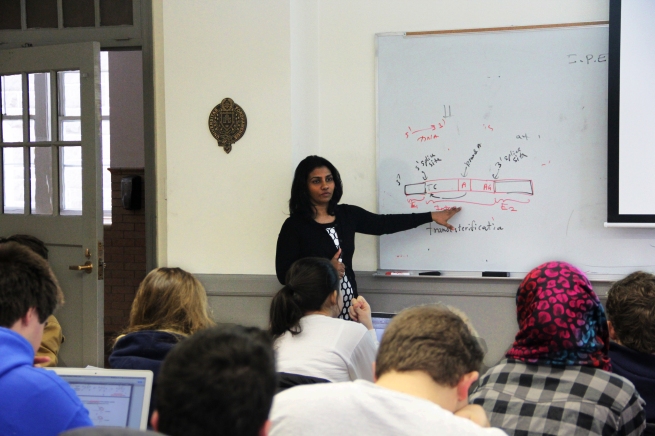
College classes are more effective when professors have more control in the classroom. Casey Chun/The Fordham Ram
By Brianna Allard
Picture this: a high school where students are engaged in their classes and teachers are passionate about the material. Educators teach in unique styles and their students are fully engaged in the class, rather than staring out the window. This may seem like a far-fetched situation, but recently there have been some charter schools that are working towards making this fantasy reality. By eliminating administrators and letting teachers control the conditions of their work environment, issues seem to vanish.
In contrast to these utopias, if you were to walk through the halls of most high schools, you would see kids sitting in rows; some stare at a board, others take notes, but most zone out. These students are uninterested in the material presented to them. However, the teacher cannot do anything to change this because there are national and state educational standards that must be met in a very specific manner. After the teachers cover all the required material, they have no time to teach what they want to using their own style. If it is an AP course, forget about any extra time. In the AP History class I took my junior year of high school, our teacher had to print his notes and give them to us two days before the test, because we did not have enough time to cover the necessities.
Fortunately, not all is lost. These teacher-run schools are the solution to many problems high schools face today. These models allow teachers to choose what they want to teach and how they want to present the material, all while meeting educational standards. This gives teachers the freedom and power they need to fully engage their students. If we have teachers who are not restricted by unyielding standards, classes will become more interesting. No student enjoys staring at a board all day and to take notes, and most teachers do not like to stand in front of a group of blank faces and lecture. This style of learning needs to be eliminated, and having teacher-run schools is the way to do it.
It is not only the teachers who benefit from these schools; students are at an advantage as well. With each teacher creating a unique class based on his or her teaching style, students are able to pick classes and teachers whose style would best improve their learning. I, along with many other students, referred to my high school as a prison because of the rigid rows of desks and rigorous note-taking. Had every class presented me with an actual change of scenery, rather than a change of rooms, high school would not have been such a prison.
In addition to solving the problem of disengaged students, these schools eliminate the communication gap between teachers and administrators as the teachers would become administrators. In these schools, teachers evaluate one another, which is a much more effective system. With these types of evaluations, teachers can give and receive constructive criticism much better than outside administrators, because they are on common ground. We all remember when a principal or vice principal would come into the room. The whole atmosphere would change, and most of the students would focus on the reaction of the administrator rather than the lesson being nervously presented by the teacher. If it were, say, your history teacher evaluating your English teacher, rather than the principal, the atmosphere would be much more casual, making it easier to proceed as if it were a normal class.
These teacher-run schools remind me a lot of the college environment. For example, each section of Faith and Critical Reasoning, a freshman theology course, is different based on the professor. However, each section fits under the same requirements put forth by the theology department. A lot of students look forward to abandoning their high school for the freedom associated with college. Schools run by teachers would act as a preview to this freedom and as a result, high school wouldn’t be so bad. Hopefully.
Brianna Allard, FCRH ’18, is a communications and media studies major from Somer, CT.
